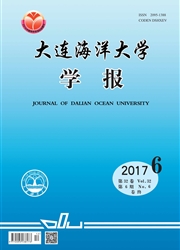

 中文摘要:
中文摘要:
为了进一步了解在室内海水中长期培养对蒙古裸腹溞Moina mongolica种群增长能力所产生的影响,研究了晋南品系不同采集时间的两溞种(1982溞和2006溞)对极端环境的耐受性,以及在温度为25~32℃、盐度为15~35、非离子氨(NH3-N)为1.05~6.62 mg/L条件下两溞种的生殖和种群增长能力??果表明:1982溞较2006溞更具有较强的耐极端环境的能力;温度对两溞种生殖和种群增长的影响差异均显著,两溞种的生殖指标和内禀增长率无明显差异,其最适温度均为28℃;在盐度为15~35时,两溞种的生殖和种群增长差异不显著;非离子氨的影响显著,驯化时间增长能改变溞对非离子氨的适应能力?说明在海水中长期培养蒙古裸腹溞对该溞的种群增长能力不会产生明显的不良影响,但在高温、高盐、高非离子氨条件下,1982溞表现出较强的耐受性,更适合作为海水大规模培养的对象。
 英文摘要:
英文摘要:
The extreme environmental endurance and effects of temperature(25-32 ℃),salinity(15-35),and NH3-N(1.05-6.62 mg/L) on reproduction and population growth of water fleas Moina mongolica population(Jinnan 1982 and Jinnan 2006) acclimatized for different periods in order to evaluate the effects of long-term cultured in laboratory seawater on the population growth of the water fleas.The results showed that there were no significant differences in reproductive parameters and intrinsic growth(rm) between the two populations acclimatized at different temperatures,though there were significant differences in reproduction and population growth between the two populations acclimatized at different temperatures,with the optimum temperature of 28 ℃.The water fleas acclimatized at salinity varying from 15 to 35 had no significant differences in population growth.In different NH3-N levels,however,the water fleas acclimatized for longer period showed stronger endurance.From the comparison of the resultant data,no detrimental effects were found in M.mongolica cultured in seawater for long-term,but M.mongolica of 1982 had stronger thermal adaptability,indicating more suitable for the large-scale culture in seawater.
 同期刊论文项目
同期刊论文项目
 同项目期刊论文
同项目期刊论文
 期刊信息
期刊信息
